-
(单词翻译:双击或拖选)
The market and business have no nationality or borders, says this western Ukrainian businessman.
Nor do they have any smell, adds a smiling eastern Ukrainian counterpart. And both agree that money is money.
Yevhen Bisovsky earns his money as director of the RosanPak Packaging Company in the western city of Lviv. Nearly 30 percent of RosanPak's $40 million annual turnover3 is in Russia.
 |
| Konti Confection Company |
Oleh Lohvinov is director of the Konti Confection Company in the eastern city of Donetsk.
Konti's $90 million sales in Russia in the first half of 2008 slightly exceeded those in Ukraine.
Lohvinov says Konti's priority is to expand in Ukraine, Russia, China and other post-Soviet markets, instead of the European Union.
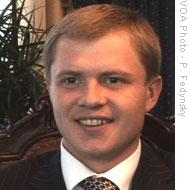 |
| Oleh Lohvinov |
Lohvinov says the European market has long been saturated4 and stabilized5, adding that it takes colossal6 amounts of capital to establish and distribute a brand in the European market.
The businessman notes there are a number of countries where he can spend less and get a better result.
High-speed machines at RosanPak mold various types of containers for cakes, ice cream or anything a producer may want to package in plastic.
 |
| Yevhen Bisovsky |
Director Yevhen Bisovsky says less than one-fourth of the company's sales are in the European Union. He adds that the so-called Shengen Customs Zone, the strict EU border-control arrangement, makes it difficult for Ukrainian business to expand westward7.
For a RosanPak employee to head west, says Bisovsky, he needs a visa; initially8 for a month, then three months, and half a year.
The businessman says there is no such thing as a five-year Shengen Zone visa, which would allow a RosanPak representative to enter and work the EU market. Instead, he needs an invitation, and must wait in very long lines at consulates9 each time.
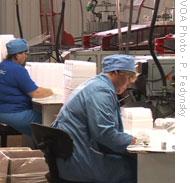 |
| Employees at the RosanPak Packaging Company in the western city of Lviv, Ukraine |
Trucks that deliver cargo10 to the European Union often get stuck for days at Ukraine's western borders because of the lack of streamlined customs procedures and a shortage of crossing points.
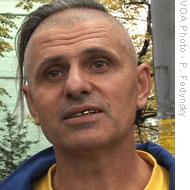 |
| Anatoly Ruchka |
Ukrainian truck driver Anatoly Ruchka of Dnipropetrovsk Oblast has driven in both directions. He agrees with the assessment11 of businesspeople, who give roads in the West high marks compared to those in Ukraine and Russia.
Ruchka also notes how well roads in the West are maintained, how clean they are and how well drivers are treated. In Russia, he says, Ukrainian drivers are also referred to in the pejorative12 "khokhol," unlike the West where drivers are treated equally regardless of their nationality."
Some Ukrainians fear Russian investment will also bring unwelcome
Russian cultural influence to the country. Yuri Pukalsky, vice13 president of the Lviv Chamber14 of Commerce, says that may happen, but should not be feared.
Yuri Puka
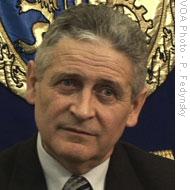 lsky
lsky
Pukalsky says Ukrainians themselves should become stronger, and then Russian influences will not be so frightening. That way, he adds, Russian money will work for the Ukrainian economy, but he repeats - it is up to Ukrainians to become stronger.
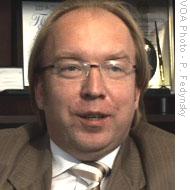 |
| Hennadi Chizhikov |
Pukalsky's counterpart in Donetsk, Hennadi Chizhikov, says Ukrainian businesspeople are doing just that, not only recognizing Russian competition, but developing a sense of national identity to meet foreign competitors head on.
Chizhikov says he likes the fact that Ukrainian retailers15 are beginning to form associations. He calls that an example of emerging civil society in Ukraine.
But a lot remains16 to be done before Ukrainian business is fully17 able to compete, not least of which is the enactment18 of economic reforms now stymied19 by political infighting in Kyiv, as struggles between the president and prime minister spill over into a parliament that cannot pass much-needed legislation.
 收听单词发音
收听单词发音
1
geographic

|
|
| adj.地理学的,地理的 | |
参考例句: |
|
|
|
2
Soviet

|
|
| adj.苏联的,苏维埃的;n.苏维埃 | |
参考例句: |
|
|
|
3
turnover

|
|
| n.人员流动率,人事变动率;营业额,成交量 | |
参考例句: |
|
|
|
4
saturated

|
|
| a.饱和的,充满的 | |
参考例句: |
|
|
|
5
stabilized

|
|
| v.(使)稳定, (使)稳固( stabilize的过去式和过去分词 ) | |
参考例句: |
|
|
|
6
colossal

|
|
| adj.异常的,庞大的 | |
参考例句: |
|
|
|
7
westward

|
|
| n.西方,西部;adj.西方的,向西的;adv.向西 | |
参考例句: |
|
|
|
8
initially

|
|
| adv.最初,开始 | |
参考例句: |
|
|
|
9
consulates

|
|
| n.领事馆( consulate的名词复数 ) | |
参考例句: |
|
|
|
10
cargo

|
|
| n.(一只船或一架飞机运载的)货物 | |
参考例句: |
|
|
|
11
assessment

|
|
| n.评价;评估;对财产的估价,被估定的金额 | |
参考例句: |
|
|
|
12
pejorative

|
|
| adj.贬低的,轻蔑的 | |
参考例句: |
|
|
|
13
vice

|
|
| n.坏事;恶习;[pl.]台钳,老虎钳;adj.副的 | |
参考例句: |
|
|
|
14
chamber

|
|
| n.房间,寝室;会议厅;议院;会所 | |
参考例句: |
|
|
|
15
retailers

|
|
| 零售商,零售店( retailer的名词复数 ) | |
参考例句: |
|
|
|
16
remains

|
|
| n.剩余物,残留物;遗体,遗迹 | |
参考例句: |
|
|
|
17
fully

|
|
| adv.完全地,全部地,彻底地;充分地 | |
参考例句: |
|
|
|
18
enactment

|
|
| n.演出,担任…角色;制订,通过 | |
参考例句: |
|
|
|
19
stymied

|
|
| n.被侵袭的v.妨碍,阻挠( stymie的过去式和过去分词 ) | |
参考例句: |
|
|
|















